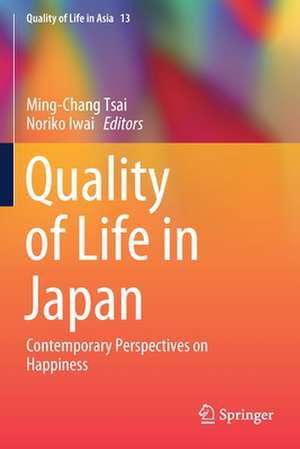Quality of Life in Japan: Contemporary Perspectives on Happiness: Quality of Life in Asia, cartea 13
Editat de Ming-Chang Tsai, Noriko Iwaien Limba Engleză Paperback – 5 sep 2020
This edited volume approaches the life experiences and well-being of Japanese people from an empirical perspective. It explores the current trend of happiness among Japanese over time and examines the association of income, lifestyle, and perceived life conditions using modern econometric models with supplementary qualitative observations. Issues relating to ageing, gender, household division of labour, and emigration are also examined to provide a wide scope of results based on both survey and field methods for culturally sensitive researchers. Going beyond the conventional cultural interpretation of the uniqueness of the Japanese case, this book provides timely, empirical evidence for understanding how the various social groups comprising the Japanese population have enjoyed a better quality of life, while some groups are very dissatisfied with social arrangements and have elected to emigrate. The book is a pioneering endeavour to reveal the detailed structure ofquality of life and well-being in Japanese society.
| Toate formatele și edițiile | Preț | Express |
|---|---|---|
| Paperback (1) | 838.27 lei 6-8 săpt. | |
| Springer Nature Singapore – 5 sep 2020 | 838.27 lei 6-8 săpt. | |
| Hardback (1) | 845.19 lei 6-8 săpt. | |
| Springer Nature Singapore – 5 sep 2019 | 845.19 lei 6-8 săpt. |
Din seria Quality of Life in Asia
- 5%
 Preț: 721.77 lei
Preț: 721.77 lei - 5%
 Preț: 721.40 lei
Preț: 721.40 lei - 5%
 Preț: 713.70 lei
Preț: 713.70 lei - 5%
 Preț: 650.81 lei
Preț: 650.81 lei - 5%
 Preț: 727.80 lei
Preț: 727.80 lei - 18%
 Preț: 728.60 lei
Preț: 728.60 lei - 18%
 Preț: 895.76 lei
Preț: 895.76 lei - 15%
 Preț: 649.71 lei
Preț: 649.71 lei - 18%
 Preț: 785.11 lei
Preț: 785.11 lei - 5%
 Preț: 902.23 lei
Preț: 902.23 lei - 5%
 Preț: 719.02 lei
Preț: 719.02 lei - 20%
 Preț: 575.20 lei
Preț: 575.20 lei - 5%
 Preț: 677.74 lei
Preț: 677.74 lei - 5%
 Preț: 360.00 lei
Preț: 360.00 lei -
 Preț: 394.12 lei
Preț: 394.12 lei - 5%
 Preț: 379.53 lei
Preț: 379.53 lei - 5%
 Preț: 936.38 lei
Preț: 936.38 lei
Preț: 838.27 lei
Preț vechi: 882.39 lei
-5% Nou
Puncte Express: 1257
Preț estimativ în valută:
160.40€ • 167.49$ • 132.45£
160.40€ • 167.49$ • 132.45£
Carte tipărită la comandă
Livrare economică 15-29 aprilie
Preluare comenzi: 021 569.72.76
Specificații
ISBN-13: 9789811389122
ISBN-10: 9811389128
Pagini: 217
Ilustrații: VIII, 217 p. 37 illus., 15 illus. in color.
Dimensiuni: 155 x 235 mm
Greutate: 0.33 kg
Ediția:1st ed. 2020
Editura: Springer Nature Singapore
Colecția Springer
Seria Quality of Life in Asia
Locul publicării:Singapore, Singapore
ISBN-10: 9811389128
Pagini: 217
Ilustrații: VIII, 217 p. 37 illus., 15 illus. in color.
Dimensiuni: 155 x 235 mm
Greutate: 0.33 kg
Ediția:1st ed. 2020
Editura: Springer Nature Singapore
Colecția Springer
Seria Quality of Life in Asia
Locul publicării:Singapore, Singapore
Cuprins
Part I Introduction.- 1.Quality of Life in Japan: Contemporary Approaches and Analysis.- 2.Happiness in Japan: A Hierarchical Age-Period-Cohort Analysis based on JGSS Cumulative Data 2000-2015.- Part II Income, Poverty and Happiness.- 3.Happiness in Contemporary Japan: Study of Lifestyle and Values Using the Relative Income Hypothesis.- 4.Income, Intra-household Bargaining Power and the Happiness of Japanese Married Women.- 5.Time Poverty and Maternal Wellbeing in Japan.- Part III Aging, Gender, and Migration.- 6.Changes in the Meaning of the Elderly Living with Children: An Analysis of Household Income Inequality among the Japanese Elderly.- 7.Ancestor Worship and Quality of Life: Transforming Bonds with the Deceased in Contemporary Japan.- 8.Intimacy, Similarity, and Equality among Married People in East Asia.- 9.Quality of Life in Japan and Emigration: The Perspectives of Japanese Skilled Immigrants in Australia.
Notă biografică
Ming-Chang Tsai is a Research Fellow in Academia Sinica, Taiwan. Working from a comparative sociological approach to life quality research, he concentrates on Asian populations to understand the influences of culture and social structures in how people in this region live happily or unhappily. He receives the Research Fellow Award from the International Society for Quality-of-Life Studies.
Noriko Iwai is Director of Japanese General Social Surveys (JGSS) Research Center and Professor of Faculty of Business Administration, Osaka University of Commerce, Japan. Leading the JGSS's Project and East Asian Social Survey Project in past decades, she has been elucidating both the changing and persistent aspects in Japanese people’s social values and behaviours. Besides family studies, the scope of her research has extended to the impact of natural disasters on people’s quality of life.
Textul de pe ultima copertă
This edited volume approaches the life experiences and well-being of Japanese people from an empirical perspective. It explores the current trend of happiness among Japanese over time and examines the association of income, lifestyle, and perceived life conditions using modern econometric models with supplementary qualitative observations. Issues relating to ageing, gender, household division of labour, and emigration are also examined to provide a wide scope of results based on both survey and field methods for culturally sensitive researchers. Going beyond the conventional cultural interpretation of the uniqueness of the Japanese case, this book provides timely, empirical evidence for understanding how the various social groups comprising the Japanese population have enjoyed a better quality of life, while some groups are very dissatisfied with social arrangements and have elected to emigrate. The book is a pioneering endeavour to reveal the detailed structure of quality of life and well-being in Japanese society.
Caracteristici
First book to analyse the patterns and causes of happiness among the Japanese people Based on new empirical investigations into how Japanese perceive their living conditions and reported levels of well-being Adopts econometric techniques to provide novel evidence for new arguments on quality of life and well-being
